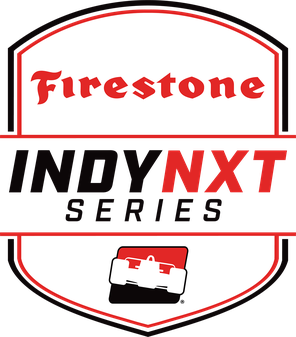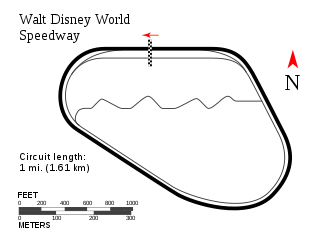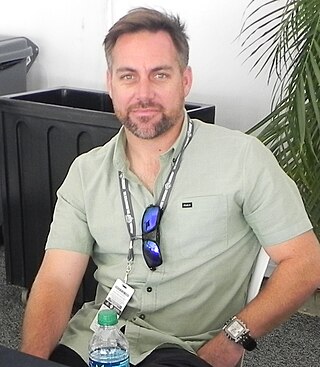
Anthony Joseph Foyt IV is an American football scout and former racing driver. He is a scouting assistant for the Indianapolis Colts, and drove in the IndyCar Series and briefly the NASCAR Busch Series. He is the third generation of the famous Foyt family.

Indy NXT, previously Indy Lights, is an American developmental automobile racing series sanctioned by IndyCar, currently known as INDY NXT by Firestone for sponsorship reasons. Indy NXT is the highest step on the Road to Indy, a program of racing series leading up to the IndyCar Series.

Walt Disney World Speedway was a racing facility located on the grounds of the Walt Disney World Resort in Bay Lake, Florida, near Orlando.

Samuel Schmidt is a former Indy Racing League driver and current NTT IndyCar Series and Indy Lights series team owner. Schmidt's brief IndyCar career included a win in 1999, but an accident before the 2000 season left him a quadriplegic. Schmidt is currently co-owner of the Arrow McLaren IndyCar team.

Cory Witherill is an American race car driver from Los Angeles who competed in the Indy Racing League, Infiniti Pro Series, Indy Lights, and ARCA series. He made an incredible bump day run on a brand new engine to qualify for the 2001 Indianapolis 500, becoming the only full-blooded Native American to race in the Indy 500. He finished 19th. In 2002 and 2003, with the collapse of the IRL team he drove for, he went to the Infiniti Pro Series driving for Ron Hemelgarn Racing. In 2002, he had 8 podium finishes and 1 win at Nashville Superspeedway. He attempted to become the first full-blooded Native American in NASCAR.

Philip Giebler is an American race car driver.

The 1996 Indy Racing League was the first season in the history of the series, which was created and announced on March 11, 1994 by the Indianapolis Motor Speedway, as a supplementary Indy-car series to the established Indy Car World Series sanctioned by Championship Auto Racing Teams (CART) since 1979. It consisted of only three races, as the season concluded with the 80th Indianapolis 500 in May. Walt Disney World Speedway was completed in time to host the first ever event of the Indy Racing League (IRL), and Phoenix International Raceway switched alliances from CART to the IRL, in order to host the second event of the season. At the conclusion of the three-race schedule, Scott Sharp and Buzz Calkins ended up tied for first place in the season championship. With no tiebreaker rule in place, the two drivers were declared co-champions. Its creation, and the opposition of Indy Car's teams and drivers to take part in it, marked the start of 'the Split', a 12-year period of competition between rival series at the top level of American Open Wheel racing that had lasting negative effects in the sport.

The 1996–97 Indy Racing League was the second season contested by the Indy Racing League. Tony Stewart was the champion, while Arie Luyendyk won the Indianapolis 500. The lengthy season was a result of the league abandoning the concept of ending each season with the Indianapolis 500. The 1996–97 season would ultimately consist of the two races that followed the Indy 500 in the calendar year of 1996, and all events contested in the calendar year of 1997. It also saw the introduction of a new chassis and engine package.

The 83rd Indianapolis 500 was held at the Indianapolis Motor Speedway in Speedway, Indiana, on Sunday, May 30, 1999. The race was sanctioned by the Indy Racing League, and was part of the 1999 Pep Boys Indy Racing League season. Defending IRL champion Kenny Bräck started 8th and became the first Swedish driver to win the Indy 500.

The 81st Indianapolis 500 was held at the Indianapolis Motor Speedway in Speedway, Indiana over three days, May 25–27, 1997. It was originally scheduled for Sunday May 25, however, rain washed out all activities for the day. The race was started on Monday May 26, but rain halted the race after only 15 laps had been completed. On Tuesday May 27, the race was resumed, and was run to completion. The rain delay, as well as two controversies, put a damper on the month. Arie Luyendyk won the race from the pole position, his second Indy victory. Treadway Racing, in only their second season of competition, finished 1st-2nd with Luyendyk and teammate Scott Goodyear. The team became the first to sweep the top two finishing position at Indianapolis since Leader Cards in 1962.
American Dream Motorsports was a racing team that competed in the Indy Racing League's Indy Lights series and the IndyCar Series' Indianapolis 500 owned by Eric Zimmerman and William T. Kelsey. Until May 2008 it was known as Playa Del Racing and was owned by Jeff Brougher, Ernie Moody, Gary Sallee, and Susan Schafer.
The 2006 IRL Indy Pro Series was the fifth season of the developmental open-wheel racing series under the Indy Racing League ownership, and the 21st in Indy NXT combined history, as officially recognized by IndyCar. Both Menards and Nissan dropped their sponsorship of the series, which was renamed to Indy Pro Series for the following two years. It was the first season to include double-header races in road course races. All teams used Dallara IL-02 chassis, now with the unbranded TWR engines, as they would remain until the end of its use in 2014.
The 2002IRL Infiniti Pro Series was the first season of the series, which served as the first official developmental series to the Indy Racing League. The Infiniti Pro Series is considered a direct continuation of the original CART-owned Indy Lights series, which ran for 16 years between 1986 and 2001. While the formation of the Pro Series was independent, CART announced shortly after that Indy Lights would fold after the 2001 season. The Pro Series would later adopt the Indy Lights name in 2008 when IndyCar bought the intellectual property from CART, before being renamed into Indy NXT in 2023.

The 2004 Menards IRL Infiniti Pro Series season was the third season of the series under the Indy Racing League ownership, and the 19th in Indy NXT combined history, as officially recognized by IndyCar. All teams used Dallara IL-02 chassis and Infiniti engines.

The 2005 Menards IRL Infiniti Pro Series was the fourth season of the series under the Indy Racing League ownership, and the 20th in Indy NXT combined history, as officially recognized by IndyCar. All teams used Dallara IL-02 chassis and Infiniti engines, a combination that was raced for the first time on road courses.
Treadway Racing is a former auto racing team that competed in the early seasons of the Indy Racing League IndyCar Series. The team was owned by Indianapolis business man Fred Treadway. Prior to the IRL's inaugural season in 1996, Treadway was able to sign former Indianapolis 500 Champion Arie Luyendyk to drive for his freshman team. Additionally, two long time backers of IndyCar teams, Bryant Heating & Cooling Systems and Jonathan Byrd's Cafeteria, were secured as sponsors.

The 1997 Indy 200 at Walt Disney World was the third round of the 1996–1997 Indy Racing League. The race was held on January 25, 1997, at the 1.000 mi (1.609 km) Walt Disney World Speedway in Bay Lake, Florida, being the first IRL race of the calendar year 1997. It was the first race with the new chassis from Dallara and G-Force, as well as for the 4000 cc naturally aspirated engines supplied by Oldsmobile and Infiniti, and it marked the first time that a major open-wheel series contested a race with brand-new cars and engines. The race was won by Eddie Cheever after being called off on lap 149 of the scheduled 200 due to heavy rain.
Charles Richard Crews is an American race car driver from Dallas, Texas.
AFS Racing is a professional racing team participating in the IndyCar Series and previously the Firestone Indy Lights series. It is owned by Gary Peterson, the founder of Automatic Fire Sprinklers for which it is named, and is based in Huntington Beach, California.
Byrd Racing is an American racing team in the IndyCar Series. The team is owned by Virginia (Ginny) Byrd and her sons David and Jonathan Byrd II. They also run select races in partnership with Rick Ware Racing starting in select races in 2020 in the NASCAR Cup Series, the partnership continued in the NASCAR Cup Series in 2021 with James Davison in the No. 15. They also partnered for the 2020 Indy 500 with Rick Ware Racing and Dale Coyne Racing.










